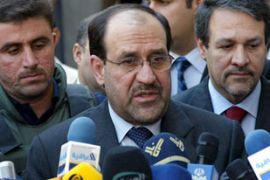Sunni bloc back in Iraqi parliament
National Dialogue Front returns but says al-Maliki cannot solve Iraq’s problems.

Published On 8 Sep 2007
The Sunni bloc was the last of several boycotting groups to return to the assembly, although the cabinet of Nuri al-Maliki, the prime minister, remains shaky after walkouts and resignations by 17 of 40 ministers.
| Related link | ||
|
|
Speaking from Amman, Jordan, the Iraqi National Dialogue Front’s Saleh al-Mutlaq told Al Jazeera that al-Maliki’s government would not be able solve the country’s problems.
“We need reconciliation, and this government cannot make reconciliation. We need a liberal government and this government is not liberal one, we need a secular government,” he said.
“Without such a government the violence will continue.”
The return of the Sunni bloc will be a boost to the Iraqi assembly as it prepares to tackle several key pieces of legislation that Washington sees as benchmarks to measure Iraq’s progress towards national unity.
Oil revenue sharing
One law will allow members of Saddam Hussein’s Baath party back into positions of authority, and the other will determine how Iraq’s oil revenues should be shared.
Iraq has the world’s third-largest proven oil reserves but its refineries have suffered from a decade of sanctions and four years of violence since the US-led invasion of 2003, which have hampered investment.
The country is aiming to raise its oil output to three 3m barrels per day next year and to 6m a day within a decade, Hussein Shahristani, Iraq’s oil minister, said at the Iraq Petroleum 2007 conference in Dubai on Saturday.
But Dathar al-Khashab, director-general of the state-run Midland Refineries, said that Iraq would require up to $25bn in investment to expand its refining capacity over the next five to seven years.
‘Tough questions’
The halting steps towards political reconciliation notwithstanding, the problematic situation in al-Maliki’s government drew criticism on Friday from General David Petraeus, who is to deliver a report on US progress in Iraq to congress.
| “I will lay out a vision for future involvement in Iraq, one that I believe the American people and their elected leaders of both parties can support” President Bush |
In a letter to US soldiers, he said that Iraqi leaders had not used the so-called surge strategy to help bridge their differences.
“One of the justifications for the surge, after all, was that it would help create the space for Iraqi leaders to tackle the tough questions and agree on key pieces of national reconciliation legislation,” he said in the letter.
“It has not worked out as we had hoped.”
In Sydney, Australia, where he is attending the Apec forum summit, George Bush announced on Saturday that he would make a speech defending his strategy in Iraq after Petraeus had completed his testimony to congress.
He said: “By coming together on the way forward, we will strengthen Iraq’s democracy, deal a blow to our enemies, secure interests in the Middle East, and make our nation safer.”
Media reports have suggested that Bush would deliver the speech on Thursday.
Source: Al Jazeera, News Agencies
